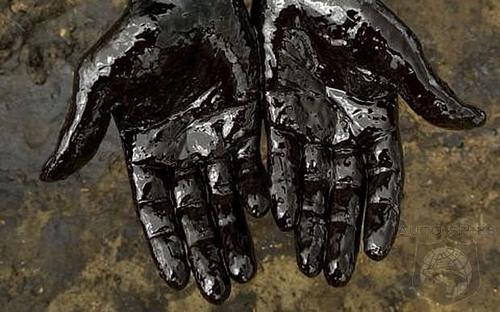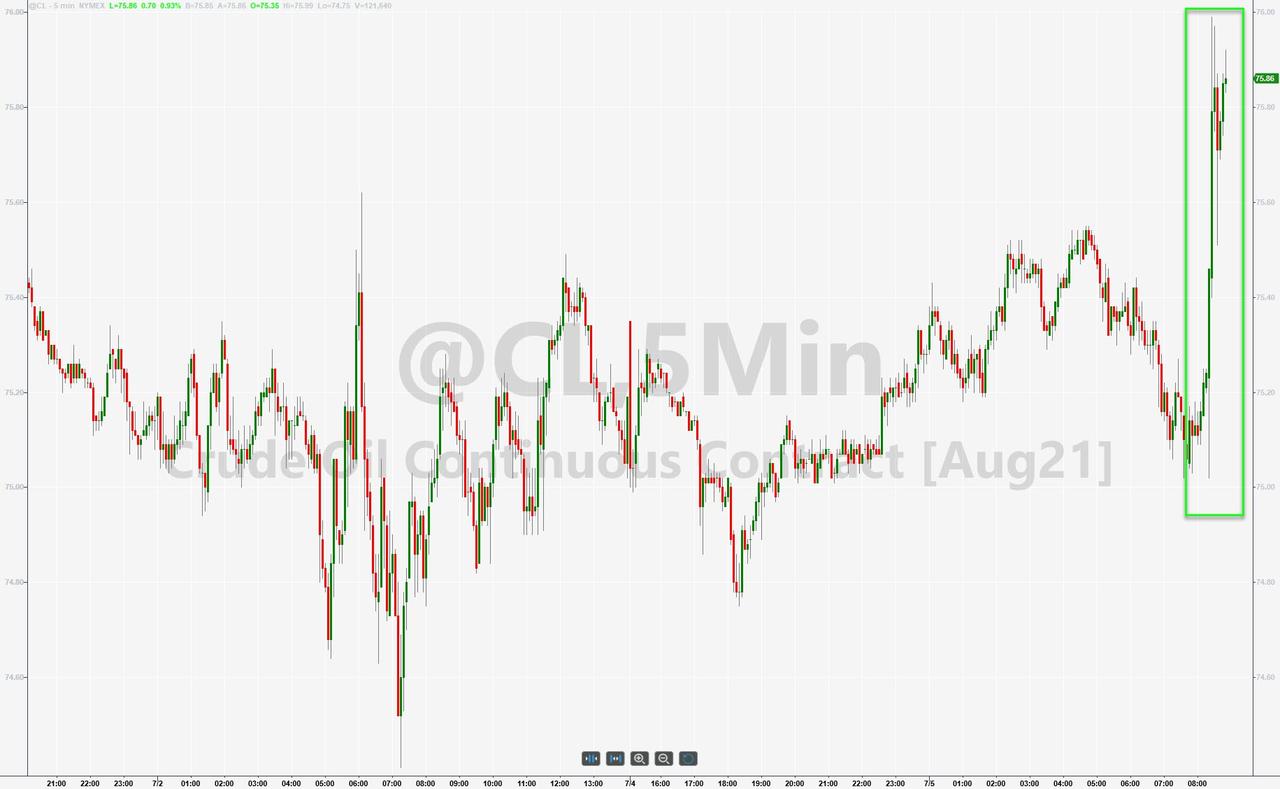Oil Jumps After OPEC+ Abandons Meeting With No Deal
We asked yesterday, Is the world about to go through another 2014 Thanksgiving massacre when OPEC collapsed sending the price of oil crashing and unleashing a brief if a catastrophic wave of destruction across the US shale sector?

It would appear we have an answer - at least in the short-term - as Bloomberg reports that OPEC+ failed to reach a deal and called off a meeting planned for today, leaving the oil market to contend with much tighter supplies than had been expected.
The UAE’s position hasn’t changed, according to a person with knowledge of the country’s thinking. The joint monitoring committee, the JMMC, needed more time to consider the UAE’s position, and the country remains committed to an increase in OPEC production, they said.
Of course, that leaves the UAE still opposing an extension of the deal.
Stalemate stands, it seems.
This decision is implicitly bullish as there is no explicit increase in production across the cartel:
(Click on image to enlarge)

But, as Bloomberg's Javier Blas notes, while the outcome today is the most bullish, I can’t but think that for 2022 it’s still the most bearish. It’s simply a matter of when and how, rather than if, the UAE puts more barrels into the market. It may happen next month, next year, or after April 2022, but I don’t see how Abu Dhabi walks away from this crisis pumping at a limit of 3.168 million barrels a day. The risk that the whole OPEC+ alliance unravels has also increased significantly. It may be a short-term bullish, medium-term bearish, scenario.
Here's the background for today's decision:
Commodity traders are wondering what happens next as just two days after the UAE refused to fall inline with the rest of OPEC+, late on Sunday, in a Bloomberg TV interview, Saudi Prince Abdulaziz said that “we have to extend,” referring to the deal agreed upon by all but the UAE on Friday, according to which oil production would be increased by 400kbd over the next few months, while also extending the broader production quota agreement until the end of 2022 for the sake of stability: “the extension puts lots people in their comfort zone” said the Saudi, adding that Abu Dhabi was isolated within the OPEC+ alliance.
"It’s the whole group versus one country, which is sad to me but this is the reality", the Saudi summarized the potentially explosive situation, which has seen Saudi Arabia and the United Arab Emirates crank up the tension in their OPEC standoff which as Bloomberg summarizes, has left the global economy guessing how much oil it will get next month.
The bitter clash between the Saudis and UAE has forced OPEC+ to halt talks twice already, with the next meeting scheduled for Monday, putting markets in limbo as oil continues its inflationary surge above $75 a barrel. With the cartel discussing its production policy not only for the rest of the year, but also into 2022, the solution to the standoff will shape the market and industry into next year.
While traditionally the oil cartel has been shy of publicity, keeping its spats behind close doors, on Sunday the fight between the two key producers broke into public view with both countries, which typically keep their grievances within the walls of the royal palaces, airing their differences on television, with Riyadh insisting on its plan, backed by other OPEC+ members including Russia, that the group should both increase production over the next few months, while also extending the broader agreement reached in the aftermath of the oil price collapse of 2020 until the end of 2022 to avoid a production glut.
Just hours earlier, the Emirati energy minister, Suhail al-Mazrouei, again rejected the Saudi-proposed deal extension, supporting only a short-term increase and demanding better terms for itself for 2022.
“The UAE is for an unconditional increase of production, which the market requires,” Al-Mazrouei told Bloomberg Television earlier on Sunday. Yet the decision to extend the deal until the end of 2022 is “unnecessary to take now.”
What happens next is binary: while on one hand, Abu Dhabi is forcing OPEC into a difficult position: accept its requests, or risk unraveling the cartel without an output agreement in place, which would squeeze an already tight market, sending crude prices sharply higher. But only briefly because as Bloomberg notes, a more dramatic scenario is also in play - a repeat of Thanksgiving 2014 - when OPEC risks breaking down entirely, risking a free-for-all that would crash prices in a repeat of the crisis last year. Back then, it was a disagreement between Saudi Arabia and Russia that triggered a punishing price war, which according to some sparked the March 2020 liquidation panic, not the covid shutdown panic.
Speaking to Bloomberg, Prince Abdulaziz said that without the extension of the agreement there’s a fallback deal in placeunder which oil output doesn’t increase in August and the rest of the year, potentially risking an inflationary oil price spike. Asked if they could hike production without the UAE on board, Prince Abdulaziz said:
“We cannot.” Which, of course, is false: should OPEC collapse it will be every oil exporter for themselves, and after a brief price spike oil will crater once again.
According to Bloomberg, OPEC+ nations, oil traders and consultants have been stunned by the severity and duration of the fight, and the apparent lack of communication between the two. Prince Abdulaziz said he had not spoken to his counterpart in Abu Dhabi since Friday -- even as he insisted he remained his friend. “I haven’t heard from my friend Suhail,” he said, adding he was ready to talk. “If he calls me, why not?” Asked if more senior officials had been in touch, he declined to comment.
At the center of the dispute is a word key to OPEC+ output agreements: baselines. Each country measures its production cuts or increases against a baseline. The higher that number, the more a country will be allowed to pump. The UAE - a relatively minor oil producer - says its current level, set at about 3.2 million barrels a day in April 2020, is too low, and says it should be 3.8 million when the deal is extended into 2022.
That, however, is a non-starter to Saudi Arabia and Russia, which have rejected re-calculating the output target for the UAE, fearing that conceding to one member would prompt everyone else in OPEC+ to ask for the same treatment, unraveling the deal that took several weeks of negotiations, and the the help of U.S. President Donald Trump as broker, with the ultimate outcome being another glut of supply.
Prince Abdulaziz suggested that Abu Dhabi was cherry picking its new output target, and it would set a bad precedent. “What kind of compromise you can get if you say my production is 3.8 and this is going to be my base,” he said.
For its part, Abu Dhabi - which in April 2020 accepted its current baseline - said it doesn’t want the straitjacket to stay on for even longer, arguing that it has spent heavily to expand production capacity, attracting foreign companies too.
Meanwhile, as OPEC+ bickers, a potential wildcard is the flood of even more oil supply: Iran is expecting to return to the oil market as soon as it reaches a nuclear deal with Biden, boosting global supply by several millions barrels of oil.
And so, markets remain on edge ahead of the next OPEC+ virtual meeting scheduled for Monday at 3 p.m. Vienna time, although Prince Abdulaziz suggested it wasn’t set in stone. He wouldn’t comment on the chances of finding a consensus, saying he would work hard to seek one. “Tomorrow is another day.”
***
And circling back, we now know "tomorrow's" decision - no deal!
Disclaimer: Copyright ©2009-2021 ZeroHedge.com/ABC Media, LTD; All Rights Reserved. Zero Hedge is intended for Mature Audiences. Familiarize yourself with our legal and use policies every ...
more


